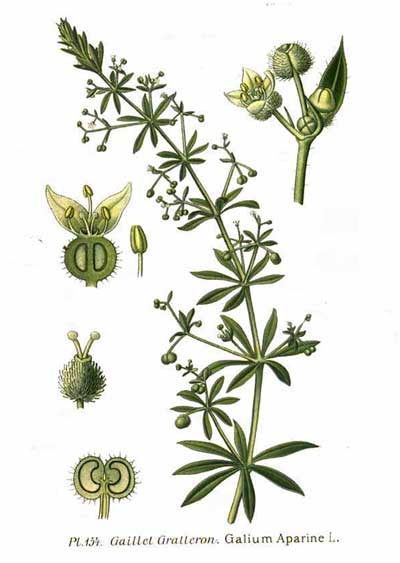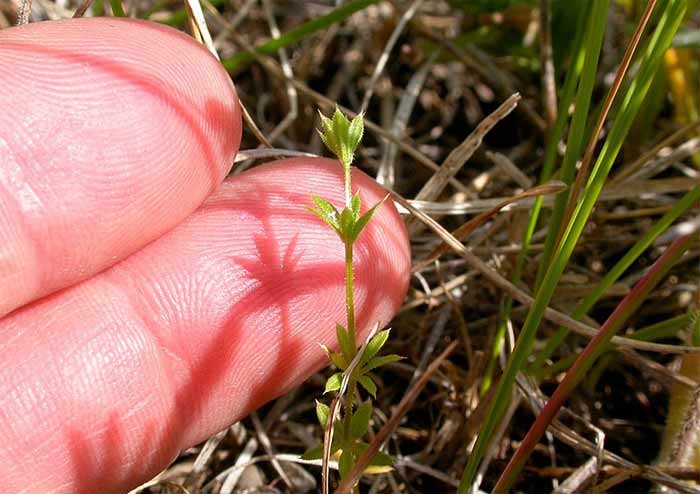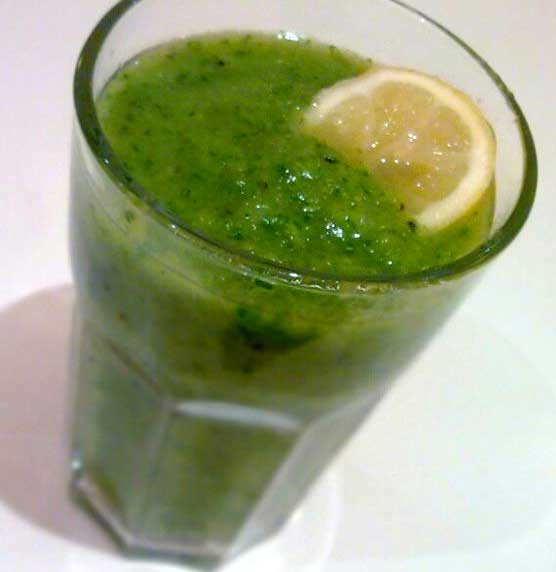Cleavers in herbal medicine
Cleavers (Galium aparine) purify the body. They make an excellent cleansing tonic that purifies both the lymphatic system and urinary tract. Cleavers help remove toxins from the blood and intestines. They also make a cooling herbal drink when treating feverish conditions.

Cleaver tea is often used as a wash for burns, scrapes, abrasions, ulcers, dandruff, itchy scalp, and other skin problems. The tea is also good for relieving stress, tonsillitis, and prostate disorders.
Cleaver tea is a great spring tonic.
Gather cleavers in spring to make a nourishing, refreshing green drink. Blend with strawberries, blueberries, and other favorite ingredients for a tasty treat. Add some dandelion greens for extra strength.
Spring tonics help get rid of the winter blues, uplifting the spirit, and bringing about feelings of well-being. Drink them daily for a week or two for an increase in energy, sweet smelling breath, and glowing skin. Your lymphatic system will thank you.
Cleavers can also be used in a juicer. They are most potent when consumed without heating or cooking. Although cleavers tea is beneficial, green cleavers are best used fresh and raw. They are full of nourishing live enzymes.
Cleavers can also be cooked as a vegetable (like spinach), used in herbal tea, or preserved in an alcohol based tincture for winter use.

Use cleavers for bladder problems.
When treating kidney and bladder problems, cleavers should be mixed with Uva-Ursi and marshmallow root for best results.
Cleavers is a natural diuretic. The herb is useful when treating fluid retention and edema. Drink three cups of tea per day for best results.
Cleavers have many uses.
Cleavers tea is used as a remedy for asthma and other lung problems. Use with echinacea or calendula for added strength.
They may also be used as a gentle laxative for a natural constipation remedy.
Cleavers are also used to treat tumors in the mouth and throat.
Use cleavers to tone the skin.
Cleavers make an excellent facial toner that helps clear the complexion. Use in tea form and splash on after washing. You can also apply with a cotton ball or spray bottle. Drink cleavers tea and use it on the skin as a wash. After a couple of days, acne, eczema, and other skin problems should be clearing up.
Use cleavers in poultices.
Cleaver poultices have been used in herbal medicine for hundreds of years. Apply a cleavers poultice or compress to sunburn and shallow wounds.
They are also good for healing bites and stings. Cleavers help to draw out poisons and toxins causing insect bites and other wounds to heal faster.
Read more about making poultices and herbal products here.
Cleavers in times of physical stress
When trauma strikes, and you are unable to exercise, cleavers can be a life saver. If your body has been thru a stressful situation like hip replacement surgery, a broken bone, or anything else that makes it hard to walk or move, cleavers come to the rescue.
The lymphatic system depends on movement to function. It does not have a pump like the heart to move things along. When you can't move, get some cleavers into your body. Use fresh or dried cleavers in teas, green drinks, compresses, and massage oils.
Use dried cleavers in oil infusions.
Dried cleavers make a wonderful infused oil that keeps the lymphatic system healthy. Use the infused oil in massage, gently stroking areas behind the knees, the pelvic area, the sides of the neck, the lower back, and under the arms.

Scientific studies
Research shows that cleavers have lots of healing properties.
- Cleaver extracts contain lots of flavonoids, polyphenols, fatty acids, and other beneficial substances.
- Cleavers stimulate the immune system and are anti-inflammatory.
- Cleavers help the lymphatic system to detox the body.
- They are also good for the blood and circulatory system.
- Cleavers are useful when treating skin problems.
- They are also anti-microbial and anti-cancer.
Research show that the herb works to improve immunity by scavenging free radicals and stimulating production of leucocytes (the first line of defense against skin infections). Data shows that traditional uses of cleavers as a remedy for skin problems is based in scientific evidence.
Read more about treating skin problems with medicinal herbs.
Herbal Jedi
In this video, Herbal Jedi takes us on a trip to his favorite cleavers patch.
Cleaver seeds as a coffee substitute
Cleavers contain caffeine! The little clinging burrs of cleavers make a fair substitute for coffee in emergency situations.
It is a tedious process, but if one is desperate for coffee and has plenty of time, a pleasant, strong coffee flavored beverage can be made using cleaver seedpods. Use three heaping tablespoons of roasted and ground cleaver seeds for two cups of coffee. Careful when roasting, they can burn up if heat is too high.
To prepare cleaver seeds for a coffee substitute, put them in a bowl and wash in cold water. Drain water off the brownish-black seeds and spread them in a shallow pan. Bake at 250 degrees for 20-30 minutes until completely dried and slightly roasted. Watch carefully so they don't burn. It would be a shame to ruin your roasted cleavers seeds after all the work.
Once your cleavers seeds are roasted, cool and grind. Pour on boiling water, steep ten minutes, and enjoy.
Use cleaver tea as a deodorant.
Cleavers can be made into an effective deodorant for body odor.
- Make a strong tea with a large handful of cleaver stalks, leaves, and a pint of water.
- Gently simmer for fifteen minutes, strain, and bottle.
- Keep in a cool place, out of direct sunlight, and apply to armpits with a cotton ball as needed.
- Cleavers deodorant will keep for about a week.
- Add a drop or two of tea tree oil to prolong shelf life.
Find more natural cures for body odor and bad breath.
Cleaver plants grow wild in the southern United States.
Cleavers grow everywhere, even in sandy, dry locations, but they prefer moist soil. They can even tolerate wet feet.
Cleavers are a vigorously growing plant that many gardeners consider a weed. Cleavers twines through hedges and flower borders producing long sticky stems that may be four feet long. In the forests, cleavers creep over the tops of other plants.
Like chickweed, cleavers are one of the first things to start growing in the spring. Cleavers have tiny bristles which cover the stem and narrow leaves. The leaves grow in whorls of six or eight.
The flowers are inconspicuous, growing in small, stalked clusters from the axils of the leaves. They develop into fruits that look like little round pill-balls and are dispersed by hooked bristles that catch on to animals or people's clothing, spreading cleaver seeds far and wide.

Cleavers nick-name is Sticky Willie.
Cleavers is known as Sticky Willie, Robin-Run-The-Hedge, and Sticky Bud. If you ever pick any, you will know why. The stems are like velcro!
Cleavers are sometimes used to curdle milk in cheese making. In Sweden, cleavers are used as a simple sieve to strain milk on dairy farms.
In past centuries, cleavers were used to stuff mattresses.
Cleavers, also known as goosegrass, are also a favorite food for geese. The twining cleavers plant has many uses in herbal medicine and beyond.
*In rare cases, some people may develop a rash after picking the plant. Always consult with a healthcare professional before using any herbal remedy especially if pregnant, nursing, or taking other medications.
Sources:
https://www.ncbi.nlm.nih.gov/pmc/articles/PMC6963662/
https://www.ncbi.nlm.nih.gov/pmc/articles/PMC7464609/
Blessings to you and yours!
Thanks so much for reading my blog. Jan.

*Note - the information on this website has not been evaluated by the Food and Drug Administration.
© 2005-2024 website design and content by Janice Boling